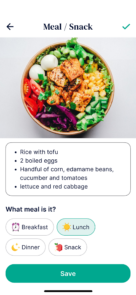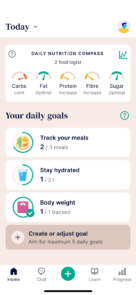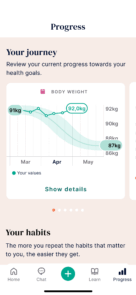
Weight loss injections: what are they and how can they help you?
Losing weight can reduce your risk of a number of health issues, including cardiovascular disease. Have you tried to lose weight through conventional means, but struggled to achieve results?
You may be eligible for prescription weight loss injections via the NHS. If you meet the eligibility criteria, you could be referred to a weight management programme, such as Oviva, where you may benefit from an approved weight loss drug and further lifestyle interventions.
How to check if you’re eligible
Key Takeaways
- There are a number of approved weight loss medications in the UK, with examples including semaglutide (Wegovy) and liraglutide (Saxenda).
- Most of these medications work by suppressing your appetite and leaving you feeling fuller for longer, so you eat less.
- You could be eligible for prescription weight loss medication via the NHS if you have a BMI over 35 and relevant weight-related health conditions.
- You may receive weight loss injections as part of Oviva’s weight management service.

Table of Contents
What medication is prescribed for weight loss in the UK?
How well do they work and which weight loss injection is best?
What are the pros and cons of taking weight loss medication?
Are there any risks and side effects?
Who is eligible for prescription weight loss injections on the NHS?
What medication is prescribed for weight loss in the UK?
At present, the following recognised weight loss medications are all prescribed in the UK:
- Semaglutide (Wegovy, Ozempic)
- Tirzepatide (Mounjaro)
- Liraglutide (Saxenda, Victoza)
- Orlistat (Xenical)
Semaglutide, tirzepatide and liraglutide all belong to a class of medications known as GLP-1 agonists. These medications work by mimicking the effects of a hormone that’s naturally released after eating. As a result, you experience feelings of fullness and a reduced appetite.
Orlistat works by preventing some of the fat from the food you eat from being absorbed.
All of these medications need to be combined with wider lifestyle changes, such as increased exercise and a healthy diet, in order to effectively promote weight loss.
See the table below for more information on weight loss injections:
| Wegovy | Ozempic | Mounjaro | Saxenda | Victoza | Xenical | |
| Prescribed for | Weight loss | Type 2 diabetes | Weight loss* Type 2 diabetes |
Weight loss | Type 2 diabetes | Weight loss |
| Frequency | Once per week | Once per week | Once per week | Once per day | Once per day | 3 times per day |
| How to take | Injection | Injection | Injection | Injection | Injection | Capsule |
| Dosage** | 2.4 mg | 1 mg/2 mg | 15 mg | 3 mg | 1.8 mg | 120 mg x 3 |
* Approved by the NHS in December 2024. NHS access remains very limited and timelines for wider availability are still being established.
** Individually recommended doses may vary. Please always follow the recommendation of your doctor or other medical professionals.

How well do they work and which weight loss injection is best?
Semaglutide (Wegovy), liraglutide (Saxenda), tirzepatide (Mounjaro) and orlistat (Xenical) have all proved effective for weight loss purposes. Of these medications, all with the exception of orlistat are available as pre-filled, injectable pens, which can be self-administered.
Orlistat is taken as a capsule and has a vastly different mechanism of action from the others. The weight loss achieved by Orlistat is often much lower than the weight loss achieved by the GLP-1 medications.
The effectiveness of a drug for weight loss can be measured in several ways. The weight loss injections table view helps to demonstrate the effectiveness of each medication.
| Semaglutide (Wegovy) | Liraglutide (Saxenda) | Tirzepatide (Mounjaro) | |
| Average Weight Loss | 15.9 kg in 68 weeks (0.9 kg every 4 weeks) | 8.4 kg in 56 weeks (0.6 kg every 4 weeks) | 24 kg in 72 weeks (1.3 kg every 4 weeks) |
| % of Patients Who Lost At Least 5% of Their Body Weight | 83.5% over 68 weeks | 63.5% over 56 weeks | 96% over 72 weeks |
It must be stressed that clinical studies can only provide averages. The weight loss medication that’s best for you may depend on your individual circumstances.
What are the pros and cons of taking weight loss medication?
Weight loss medication can be highly effective when paired with lifestyle changes.
It can be especially beneficial for people who have struggled to achieve lasting weight loss and weight management through conventional means.
Weight loss drugs are generally easy to take and to fit into a typical lifestyle. For instance, a Wegovy injection is taken once weekly. It can be self-administered and the medication comes in a pre-filled pen so you do not see the needle.
Weight loss medication should be combined with support from healthcare professionals. The medication is not, in and of itself, a solution to weight management – further efforts are required.
For example, you’ll still need to make an effort to improve your nutrition and activity levels. NICE states that:
It is appropriate to use semaglutide alongside lifestyle interventions that are provided in specialist weight management services. There is no evidence of effectiveness if semaglutide is used as a single stand-alone treatment.
An approved Tier 3 Weight Management service like Oviva can provide all the support you need.

Are there any risks?
A GLP-1 weight loss drug should not be taken if you’re pregnant or planning to become pregnant in the near future. Even after you’ve had a baby, the relationship between these medications and breastfeeding is also not yet fully understood, so it’s important to avoid using the medication until you’re no longer breastfeeding your baby.
If you have diabetes and are taking other medications to treat the condition, weight loss injections can increase the risk of your blood glucose dropping too low (hypoglycemia).
What are the side effects of weight loss medication?
The main side effects associated with GLP-1 agonists are gastrointestinal issues, with examples including vomiting, diarrhoea, nausea, stomach pains and constipation. These symptoms are usually relatively mild and improve over time.
Some people experience skin irritation around the injection site. For instance, if you self-administer stomach injections for weight loss, you might notice mild redness on your stomach in the area you administered the injection.
Less common and more serious side effects include pancreatitis and allergic reactions. If you experience allergy-like symptoms or severe stomach pain, seek urgent medical help.

Who is eligible for prescription weight loss injections on the NHS?
To be eligible for prescription weight loss injections on the NHS, you’ll typically need to have a BMI over 35 with a relevant medical condition, like type 2 diabetes or high cholesterol.
How to get a prescription for weight loss injections in the UK
Patients in England can receive prescription weight loss injections if they meet the eligibility criteria and are referred to a weight management programme by their doctor.
Your GP can tell you if you’re eligible for a weight management programme, like Oviva’s.
If you are, they can make a quick referral on your behalf. Then we handle the rest!
We’ll work with you, using a combination of medication and other lifestyle changes, to promote healthy, sustainable, realistic weight loss and weight management.
You’ll receive continuous support from a range of healthcare professionals, including dietitians, nurses, doctors and psychologists.
Are weight loss injections always through the stomach?
Weight loss injections can be self-administered in the stomach, upper arm or the front of the thigh. The pre-filled pen is designed so you will not actually see the needle during this process.
NHS doctors generally recommend the stomach as the best injection site and stomach injections for weight loss make sense for most people, as it is easy to access and a sufficiently fatty part of the body. You should leave a 5cm gap around your belly button.
However, you may choose to inject into your arms or thighs instead, if you prefer.
You can choose the same general location, but you should vary the precise injection site each time. So, for instance, if you inject into the right side of your stomach one week, you might switch to the left side of your stomach the following week.

Support on your weight loss journey
Managing your weight is personal, and there’s no one-size-fits-all solution.
If you’re referred to a programme like Oviva, you might be offered prescription weight loss injections to help with your progress.
What makes the difference, though, is the support around it. Our team will work with you to set personalised goals that feel achievable and give you the guidance you need to make changes that last.
At Oviva, it’s about finding what works for you — with the right mix of treatment and everyday support.







